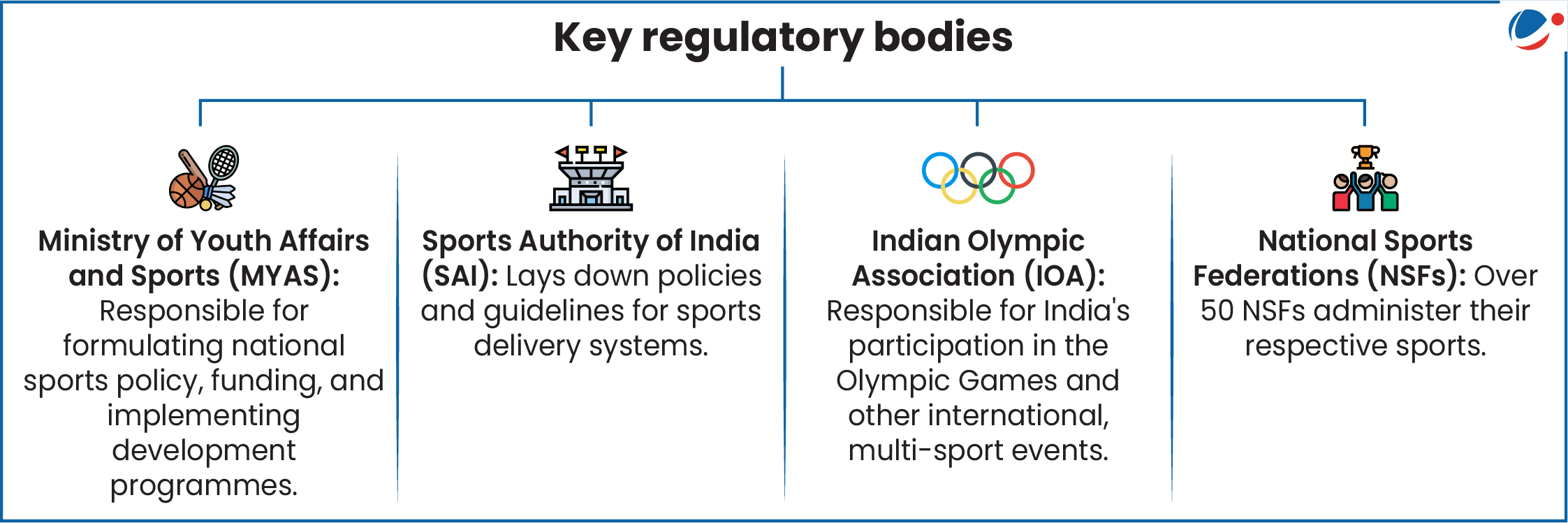Why in the news?
Recently, the National Sports Governance Bill, 2025, was given assent by the President.
Sports governance in India
- Sports regulation falls within the jurisdiction of the states, as per Entry 33 of the State List of the Seventh Schedule.
- Existing policies include the National Sports Policy (NSP) (1984, revised 2001) and the Sports Broadcasting Signals (Mandatory Sharing with Prasar Bharati) Act, 2007.
- Recently, the Cabinet approved the NSP 2025, superseding the 2001 policy.
- It is structured around five core pillars, focusing on global excellence, economic and social development through sports, making sports a people movement, and integrating sports with education.
- Recently, the Cabinet approved the NSP 2025, superseding the 2001 policy.

Key highlights of the Act
- National sports bodies: provide for establishing the National Olympic Committee, National Paralympic Committee, and National and Regional Sports Federations for each designated sport.
- These bodies will be affiliated with respective international bodies and will have affiliated units at the state and district levels.
- These bodies will be governed by international charters and statutes.
- National sports board (NSB) : It will grant recognition to sports bodies and register their affiliate unit. Only recognised bodies will receive funds from the central government.
- National Sports Body must formulate a Code of Ethics for its stakeholders, setting minimum standards for ethical and appropriate conduct.
- A recognised organisation shall be considered a public authority under the RTI Act, 2005
- The central government will decide its composition and appoint members on the recommendations of search-cum-selection committee.
- To be appointed to NSB, a person must have special knowledge or experience in public administration, sports governance, sports law, and other related fields.
- National Sports Tribunal: To adjudicate "sports-related disputes".
- It will not have jurisdiction over specified disputes such as those in relation to games organised by international bodies and internal disputes of national sports bodies.
- Oversight of elections: The central government will establish a national panel of electoral officers to oversee elections of national sports bodies.
- Every national sports body must also constitute an electoral panel to oversee elections of its affiliates.
- Powers of the central government: The Central government may exempt a national body or its affiliates from any provision of Act, if necessary in the public interest for promotion of that sport.
Need for a comprehensive sports Law in India
- Absence of a comprehensive and uniform sports law: leading to inconsistent and often outdated regulations
- The National Sports Development Bill, 2013, was not enacted.
- Politician Domination in NSFs: Politicians with minimal sports expertise often occupy key positions in NSFs.
- Earlier, FIFA suspended All India Football Federation (AIFF) due to undue influence from third parties.
- Overlapping roles and responsibilities of key organizations: like the SAI, the IOA, and NSFs create confusion and delays.
- Inadequate Funding and Utilisation: Less than 40% of the allocated budget for 2022-2023 was utilised for athlete development.
- Ineffective Policy Implementation: The National Sports Policy (1984, revised 2001) has not been successfully put into practice.
- Olympics 2036 Preparation: The legislation supports India's bid for the 2036 Olympics by ensuring compliance with the Olympic Charter and global best practices.
Conclusion
The National Sports Governance Act, 2025, aims to create a transparent, accountable, and athlete-centric sports ecosystem, aligning with global best practices and ensuring robust oversight for sustained excellence in Indian sports.
Related NewsNational Anti-Doping (Amendment) Bill, 2025 was also given assent by the President, seeks to amend the National Anti-Doping Act 2022. Key Highlights of the Act
|






